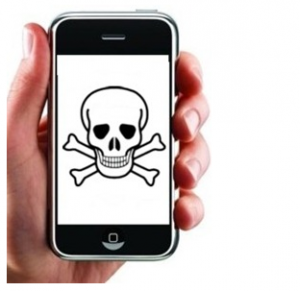
Find Out Which OS Is the Healthiest for Your Cell Phone
by Suhail Bhandari
In 540 AD, a plague near Egypt killed over 100 million people.
In 2003, SARS terrorized nearly 3.5 billion Asians.
Last month, a cell phone virus deleted all my contacts, accessed my bank accounts and reset my passwords – but not before sending out a mass SMS to everyone I know, supposedly “outing” me!
Granted my little epidemic might not have been as horrific as my first two examples, and while the overwhelming, yet misguided, support of my “coming out” was touching, in that moment, losing all my data and nearly $1,000 felt like the worst thing possible. So, here are a few heartfelt words of wisdom and a WARNING! Screen-size, megapixels, and quad core processors are important – BUT don’t forget to take a close look at your phone’s OS before you buy it.
Apple iOS
Gorgeously overpriced, I think this is the only plausible plus to Apple’s restrictive attitude when it comes to their OS. By automatically encrypting every file and “promising” not to keep track of device pins and fingerprint scans, the risk of malware attacks is reduced tremendously, which is why ‘jail breaking’ your iPhone might not be the smartest idea. Jail-breaking allows malicious applications to enter your device when you “accept” third party applications and grants them access to your personal information, including bank account details. These applications are not subjected to the same sheltered limitations that Apple enforces and therefore are easier to get from a rogue reference that will infect your cell phone. Additionally, not changing the password on a jail-broken iPhone makes it easy for malicious attackers to create worms used to infect your operating device.
Windows Mobile
If you plan on closing the door on an Apple or Android and opening a Windows, proceed with caution. When it comes to threats, Windows Mobile takes the cake, attracting a tremendous amount of malware via SMS. Adding further risk, since most of the system calls are shared with its full-featured desktop counterparts, the Windows Mobile OS is susceptible to hundreds of other pieces of malware that originated from the Windows OS and can be ported to the Windows Mobile OS.
BlackBerry
This isn’t 2012, but if you can manage to find one, BlackBerry uses what is arguably one of the most closed-source and secure operating systems of all time. Having done an excellent job of keeping the sensitive inner workings of this smart phone a secret from the public, a Blackberry is still the preferred choice for most government organizations and legal offices.
Android
More than 70% of malware out there exists on Android phones. You may literally be opening up a can of worms! The Android operating system is by far the most popular open-source operating system today. However, being community driven with no real ownership or responsibility, and minimal focus on everyday-app encryption, virtually anyone can submit applications containing malicious functions and most likely get away with it. It is said that Google Play has about 15 malware apps present at any given time. Scary, no? Well, the same research company went on find that from April to June 2013, Android malware increased by 40%, creating over 718,000 new variants.
For those of you looking for a solution, or simply some more information before you decide on a new phone, there will be an interesting discussion on Thursday, April 3rd, from 8am to 10am, at Pace University’s Michael Schimmel Center. In the meantime, while I feel that Apple is your best bet, the trick is to simply stay alert. Be wary of backdoor applications masquerading as secure ones, try not to use a common password for your email and banking requirements, and for the love of God, remember – you are not the lottery-winning, long-lost-cousin of a wealthy Nigerian Prince!
Sources:
-
CSO Online
-
Engadget.com
-
Windows Forums


 More than 200 students from area high schools came to listen and learn about the dangers of “Sexting, Cyberbullying and Distracted Driving” and to share their personal experiences and offer suggestions as to how to promote safer mobile use at the Mobile Safety Summit held on the Pleasantville Campus during spring break.
More than 200 students from area high schools came to listen and learn about the dangers of “Sexting, Cyberbullying and Distracted Driving” and to share their personal experiences and offer suggestions as to how to promote safer mobile use at the Mobile Safety Summit held on the Pleasantville Campus during spring break.